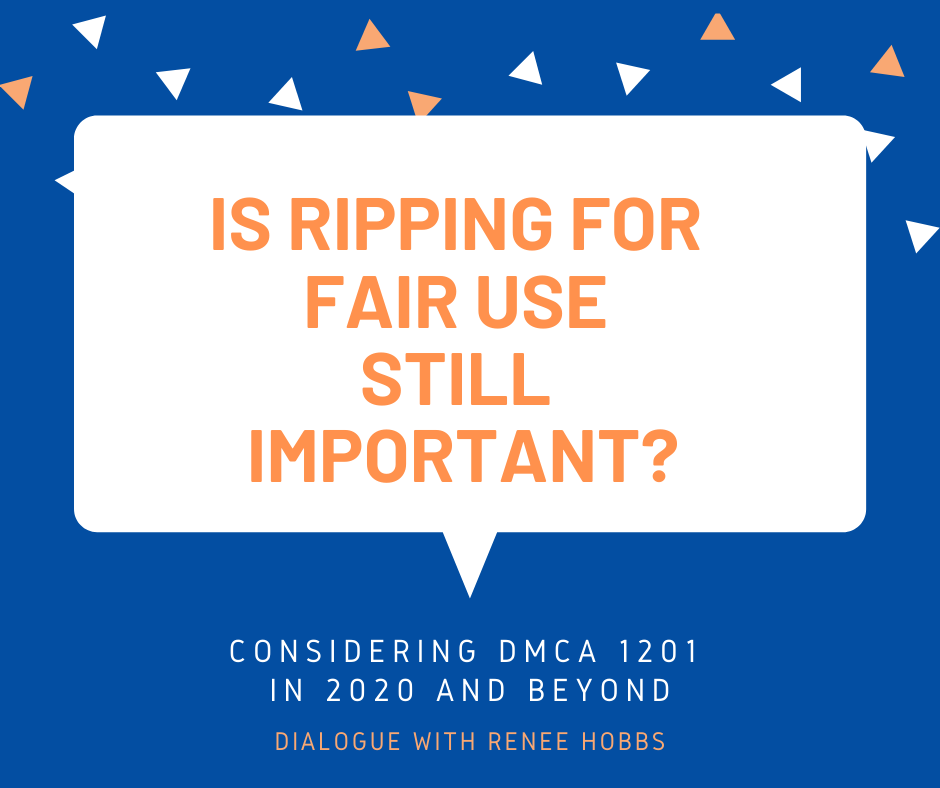Is Ripping for Fair Use Still Important? Considering DMCA 1201 in 2020 and Beyond
Presented by Renee Hobbs
Media literacy educators rely on the ability to access movies and popular culture and use them for learning purposes. As “create to learn” pedagogies become increasingly common, students, educators and library patrons continue to rely on ripped excerpts from DVDs. After all, ripped clips of movie DVDs can be educationally useful in presentations as well as in composing remix media production projects. Thanks to the DMCA 1201 exemption, ripping DVDs is legal for educational and creative purposes. But with the rise of streaming media and screencasting, is the process of “ripping” DVDs still as relevant and important as it was in 2006? In this discussion, we’ll consider the future of DMCA 1201, the law that im pacts educators, learners, creative people, and librarians.
pacts educators, learners, creative people, and librarians.
Using an open discussion, we’ll consider the question: Given the rise of streaming video and screencasting and the decline of DVD players in schools, is it worth the effort to preserve the exemption? Why or why not?
DATE: Tuesday, November 3, 2020
TIME: 2pm-3pm ET
Register for this free webinar here
Teachers and learners have always used bits of copyrighted materials in the process of learning and teaching. Many teachers collect, compile, use, and save media texts that work well in the classroom to address particular types of learning objectives, whether that be to better teach principles of multiplication, cell mitosis or the history of the French revolution. Elementary and secondary teachers greatly value the use of news and current events, scientific reports and visual materials -- pictures, videos, images, drawings and illustrations. But what about the use of resources including movie DVDs and streaming digital media? Can these be legally used by educators and students under copyright law? As "create to learn" pedagogies become increasingly common, when and how can students create remix works that use bits of copyrighted materials?
The Library of Congress Copyright Office regulates the anti-circumvention provisions of the Digital Millennium Copyright Act (DMCA), which is the law that exempts YouTube and other ISPs from liability from copyright claims and criminalizes the circumvention of digital rights management (DRM) software that protects DVDs from being copied. Every three years, if they believe their rights have been compromised by the DMCA law, petitioners can ask for an exemption. The lawyers at the U.S. Copyright Office pore over the petitions, weigh the pros and cons, and then offer recommendations to the Librarian of Congress, who ultimately grants or denies the exemptions.
In previous years, the presenter has been successful in expanding the rights of K-12 students and teachers to legally “rip” DVDs by using the Section 1201 rulemaking process, which is one of the significant ways that learners and educators can expand their rights to use copyrighted material for teaching and learning purposes. By asserting the rights of K-12 learners and educators to circumvent encryption to make fair use of copy-protected DVDs and online digital media for teaching and learning, the law begins to move beyond the needs of large-scale content owners to include the rights of educators, students and library patrons. But with the rise of streaming media and screencasting, is the process of “ripping” DVDs still relevant and important? In this discussion, we'll consider the future of DMCA 1201 as it relates to educators, learners and library patrons who with interests in digital and media literacy and media production projects. How does the DMCA 1201 ruling actually impact educators and librarians? Given the rise of streaming video and screencasting and the decline of DVD players in schools, is it worth the effort to preserve the exemption? Why or why not?